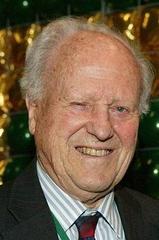 There were economists in New Zealand before Frank, but not many, and he provides a more or less direct link to the origins of the economics profession in New Zealand. There can be few economists in New Zealand now who have not benefited from his work, and that will be true of future economists too.
There were economists in New Zealand before Frank, but not many, and he provides a more or less direct link to the origins of the economics profession in New Zealand. There can be few economists in New Zealand now who have not benefited from his work, and that will be true of future economists too.
Frank was one of the founders of the Association, and he was the first editor of New Zealand Economic Papers. Throughout the first 50 years of the Association, while Frank was Macarthy Professor of Economics at Victoria University of Wellington, Economics Manager at Tasman Pulp & Paper Ltd., Professor of Money & Finance at VUW, Chair of the New Zealand Planning Council, a business director, and supposedly retired, he has maintained continuous interest in the Associations activities and been a more than occasional participant in them.
It is the range of Frank’s interests which is most impressive. His first contribution to New Zealand Economic Papers was “The Education of an Economist”[1]. Characteristically, Frank arranged for a response to his paper,[2] and it is no accident that the exchange serves as a starting point for a session at this year’s conference. Frank’s educational interests were wider than the education of economists, especially in his advocacy of the concept of human capital and of returns to investment in education to the Currie Commission in the early 1960s, in his work on educational priorities in the Education Development Council of the 1970s, and his long association with the NZ Council for Educational Research. However, of particular interest to the Association is that while during its 50 years the range and depth of economic knowledge has increased enormously, what has been constant is Frank’s advocacy of opportunities for young members to learn and to apply whatever part of it interests them.
The second characteristic of Frank’s engagement with economics and the Association has been his interest in applying economic knowledge. He kept alive as long as possible the earlier ideal of the Economic Society of Australia and New Zealand that it should connect academic economics with business and public life. Similarly, he supported the Australia and New Zealand Association of Science as a vehicle for economists to talk to other disciplines. And within the Association, he sought an outward-looking stance. Specialization is valuable, and economists need to debate among themselves and to hone their tools, but whether dealing with New Zealand’s economic diplomacy, the general stance of policy towards bureaucracy and use of the market, the appropriate framework for monetary policy, or any of the other issues with which Frank has been concerned and with which he has engaged the Association, relating academic ideas to practical issues has been high on his agenda. And we have all benefited from his efforts.
[1] F.W. Holmes, “The Education of an Economist” New Zealand Economic Papers I (1966), pp. 3-17.
